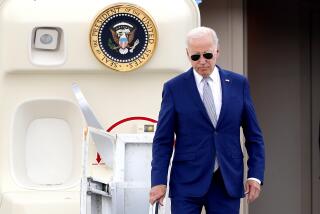MIA Stance Won’t Affect Cambodia Issue
- Share via
KUALA LUMPUR, Malaysia — The United States said Saturday that recent signs of accommodation by Vietnam on American servicemen still missing in action from the Vietnam war will not affect the U.S. position on a Cambodian settlement or on possible normalization of relations with Hanoi.
Paul D. Wolfowitz, assistant secretary of state for East Asian and Pacific affairs, said that Washington views the question of the American MIAs as a separate, humanitarian issue “in no way” connected to U.S. political differences with Hanoi.
However, he said there is no prospect of normal relations with Hanoi as long as Vietnamese troops remain in Cambodia. Wolfowitz praised efforts by members of the Assn. of Southeast Asian Nations, particularly those of Indonesia, for their work in persuading Vietnam to be more forthcoming on the MIA issue. Indonesian Foreign Minister Mochtar Kusumaatmadja “has pushed Vietnam very hard on the potential benefits” of resolving the issue, he said.
During the last two weeks, Vietnam has released the remains of 26 more American MIAs and announced through Indonesia that it will agree to high-level talks with the United States to resolve the issue within two years.
Wolfowitz was addressing a news conference here at the end of weeklong meetings of the regional group, known as ASEAN, and post-ministerial talks between ASEAN and delegations from its major trade partners--the United States, Japan, Canada, Australia, New Zealand and the European Community.
The regional organization’s members are Thailand, Malaysia, Singapore, Indonesia, Brunei and the Philippines. The Philippine representative, acting Foreign Minister Pacifico Castro, took sharp exception to a Wolfowitz comment that while the U.S. military bases seemed secure from a leftist insurrection there, “what’s at stake is in fact the future of the Philippines.” Castro construed the remark and a follow-up question from a reporter to emphasize the threat of the insurgency.
There is “no danger of the Philippines either in the near future or distant future . . . ever being overcome by Communist forces,” Castro said heatedly. “The Philippine government is in control.” Wolfowitz agreed that the insurgency “can be handled” but pointed out that the United States advocates certain political and economic reforms in the Philippines as a way to defuse it.
And in Manila on Saturday, news agencies reported that Defense Minister Juan Ponce Enrile issued a tart warning that if the U.S. Congress votes to reduce Philippine military aid, two important American bases may be closed. His remarks regarding Subic Bay Naval Base and Clark Air Base followed a House vote last week for more Philippine economic assistance but less military aid than the Reagan Administration sought.
The ASEAN conference ended with no response from Vietnam on its proposal for a Cambodian settlement that was regarded as official.
The ministers suggested indirect, mediated talks between the Cambodian resistance and Vietnam, with the Hanoi-installed government in Phnom Penh invited as part of the Vietnamese delegation. Hanoi has rejected the proposal in comments published by its official news agency.
More to Read
Sign up for Essential California
The most important California stories and recommendations in your inbox every morning.
You may occasionally receive promotional content from the Los Angeles Times.













